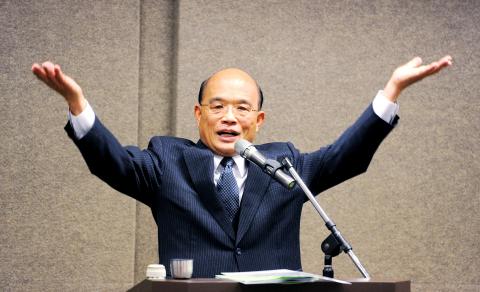China may have toned down its military threats against Taiwan, but its strategy of adopting the “soft power” of economic and cultural influence to absorb Taiwan appears to be working, Democratic Progressive Party (DPP) Chairman Su Tseng-chang (蘇貞昌) said yesterday.
“Chinese influence and presence is everywhere, as far as I’m concerned,” Su said at an event organized by the Ketagalan Institute, an educational institution founded by former president Chen Shui-bian (陳水扁).
Su cited several local TV news channels’ live broadcast of a Chinese singing competition show for hours on Friday night as an example, saying it “had gone too far and had violated the principle of proportion.”

Photo: Lo Pei-der, Taipei Times
The Chinese-language Liberty Times (the Taipei Times’ sister newspaper) reported yesterday that ETTV and CtiTV dedicated almost their entire news programs to broadcast I’m a Singer (我是歌手), a singing competition show produced by China’s Hunan TV in which several Taiwanese singers made Friday night’s final.
While the production of the show should be seen as a commercial activity, the Taiwanese TV media’s practice showed that China’s strategy of asserting its influence “into the island, into households and into the brains [of Taiwanese]” (入島,入戶,入腦) has been working, Su said.
The broadcast was only the tip of the iceberg, Su said, because TV stations, newspapers and magazines promote pro-China information on a regular basis.
“If the responsible government agency does not regulate such practices, Taiwan could become the next Hong Kong,” Su said, adding that China applied almost the same strategy to Hong Kong media before and after the 1997 handover.
Su also touched upon the anti-nuclear issue at the event, where he delivered a speech on political leadership and reform, saying that the government had failed to even release any credible assessment report on the controversial Fourth Nuclear Power Plant.
On the contrary, the government is trying to leverage the high threshold required to pass referendums and manipulate the referendum question to get its way, he said.
He called on people to participate in the planned national referendum later this year and “punish the Chinese Nationalist Party [KMT] by passing the referendum and suspending the construction of the Fourth Nuclear Power Plant.”
The suspension of the Fourth Nuclear Power Plant would provide Taiwan with an opportunity to revamp its industrial policy and upgrade its industrial structure by promoting energy conservation, he said.

Beijing could eventually see a full amphibious invasion of Taiwan as the only "prudent" way to bring about unification, the US Department of Defense said in a newly released annual report to Congress. The Pentagon's "Annual Report to Congress: Military and Security Developments Involving the People's Republic of China 2025," was in many ways similar to last year’s report but reorganized the analysis of the options China has to take over Taiwan. Generally, according to the report, Chinese leaders view the People's Liberation Army's (PLA) capabilities for a Taiwan campaign as improving, but they remain uncertain about its readiness to successfully seize

Taiwan is getting a day off on Christmas for the first time in 25 years. The change comes after opposition parties passed a law earlier this year to add or restore five public holidays, including Constitution Day, which falls on today, Dec. 25. The day marks the 1947 adoption of the constitution of the Republic of China, as the government in Taipei is formally known. Back then the Chinese Nationalist Party (KMT) governed China from Nanjing. When the KMT, now an opposition party in Taiwan, passed the legislation on holidays, it said that they would help “commemorate the history of national development.” That

Taiwan has overtaken South Korea this year in per capita income for the first time in 23 years, IMF data showed. Per capita income is a nation’s GDP divided by the total population, used to compare average wealth levels across countries. Taiwan also beat Japan this year on per capita income, after surpassing it for the first time last year, US magazine Newsweek reported yesterday. Across Asia, Taiwan ranked fourth for per capita income at US$37,827 this year due to sustained economic growth, the report said. In the top three spots were Singapore, Macau and Hong Kong, it said. South

Snow fell on Yushan (Jade Mountain, 玉山) yesterday morning as a continental cold air mass sent temperatures below freezing on Taiwan’s tallest peak, the Central Weather Administration (CWA) said. Snowflakes were seen on Yushan’s north peak from 6:28am to 6:38am, but they did not fully cover the ground and no accumulation was recorded, the CWA said. As of 7:42am, the lowest temperature recorded across Taiwan was minus-5.5°C at Yushan’s Fengkou observatory and minus-4.7°C at the Yushan observatory, CWA data showed. On Hehuanshan (合歡山) in Nantou County, a low of 1.3°C was recorded at 6:39pm, when ice pellets fell at Songsyue Lodge (松雪樓), a